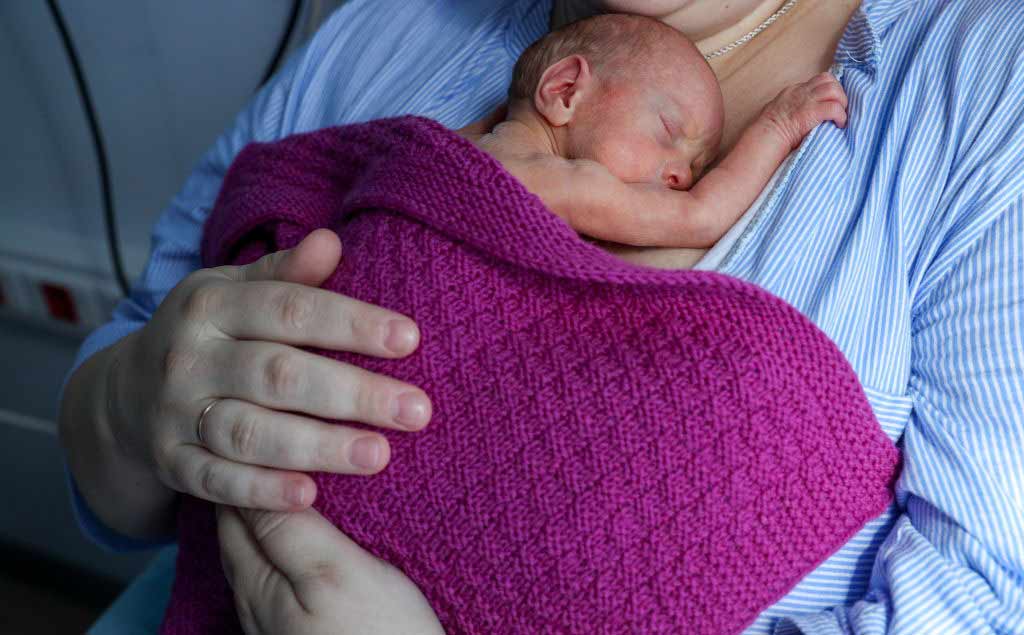When a preborn baby is diagnosed with a disability or a life-limiting medical condition, doctors will often offer abortion as the best solution. But abortion is not a “treatment” for these children and never could be. Not only would abortion in these circumstances be an act of eugenics against the baby, but it could have serious mental health side effects for the parents. In fact, research suggests that having an abortion after a confirmed poor prenatal diagnosis leads to significantly worse mental health outcomes for the mother and her family than carrying the baby to term.
This makes sense when we consider that prior to diagnosis, which often doesn’t take place until between 14 and 21 weeks, these children were typically very much “wanted” by their parent(s). Abortion of a “wanted” child is a known risk factor for post-traumatic stress disorder symptoms in these women. Since abortion is not the answer, what is?
Perinatal hospice and palliative care programs are, first and foremost, “a philosophy of care and an approach to medicine,” and “a holistic model of care, which involves medical support, nursing support, communication, understanding, psychological care, spiritual care, bereavement care and more.” According to PerinatalHospice.org, 46 states have at least one perinatal hospice and palliative care program, and these programs extend far beyond the immediate hospital setting. In fact, just as medical professionals are taught that “discharge planning begins at admission to the hospital,” ideally bereavement support should begin at the time of prenatal diagnosis for the expectant mother and her family.
This family-centered approach can be tailored to the needs of each individual family. Perhaps the mother needs someone to attend her prenatal appointments with her. Alternate arrangements can be made for a mother who wants to attend a birthing class but doesn’t want to be surrounded by women expecting healthy babies. The woman and her family may want to plugin to a support group, either during the pregnancy or up to several years after their baby’s birth and death. A team of caregivers can help the family develop an individualized birth plan to maximize bonding during whatever time they have with their baby. Pictures, fingerprints and footprints, a lock of hair, impressions of the hands and feet, and many more options can help the family create precious lasting memories.
READ: Mom chooses life for baby with anencephaly: ‘She can feel our love’
On Perinatalhospice.org, many parents share achingly beautiful testimonies about their experience with perinatal hospice and/or palliative care for their baby:
“This journey was beautiful because we were able to celebrate her life and not look at it as a tragedy. All our baby daughter will ever know is love,” explained John.
“Parents often say they’d do anything to keep their kids safe,” said Heidi. “For us, we feel like we were powerless in keeping Jonah alive, but to our best ability and our best understanding of the situation, we kept him as safe and as comfortable as we could. We were the best parents we could be for him.”
“I didn’t voluntarily return her to God; I had no choice. I did have a choice in how I could love her, honor her, share our journey and her life with those people that we loved and knew us,” explained Alessandra. “We are all better for having followed our daughter’s lead in this story. She was a gift and I am grateful, every day, that we allowed ourselves to receive it.”
Ultimately, the goal is to support the mother and her family and to acknowledge and celebrate the dignity, value, and beauty of their preborn baby.
Indiana, Kansas, Minnesota, Arizona, Mississippi, and Oklahoma all mandate that preabortion counseling when the woman is aborting because of fetal abnormalities include education on perinatal hospice and palliative care as an option. Indiana lists the following possible perinatal hospice and palliative care services in a brochure:
- Prenatal support – emotional, spiritual, and medical
- Support groups for parents, siblings, and others
- Guidance in working with medical specialists
- Childbirth education and preparation
- Develop individualized personalized birth plans
- Coordinate discharge from hospital
- Assist in creating memories, keepsakes, mementos, and treasures
- Assist with memorial service and funerals
- Emotional and bereavement support
- Pain management for baby, if necessary
However, one word of caution around perinatal hospice and palliative care programs: there is no specific licensing required in order to be considered a perinatal hospice organization, and some of these organizations may be abortion-neutral rather than pro-life when counseling parents who are uncertain whether to carry to term or abort. These organizations may not be aware of the negative effects on the mental health of women who choose to abort after a prenatal diagnosis. They may not be educated on the significant physical risks of 2nd and 3rd-trimester abortions, including induction abortion, which is described by former abortionist Dr. Anthony Levatino in the video below:
In short, the pro-life community cannot rely on perinatal hospice and palliative care organizations to do their work for them. Every sidewalk counselor, every pro-life organization needs to be aware of local perinatal hospice options to which to refer parents in crisis.
Be Not Afraid is one completely pro-life perinatal hospice organization. Spokeswoman Tracy Winsor told Live Action News, “BNA offers a comprehensive support system for parents carrying to term following a prenatal diagnosis, and we are happy to talk to undecided parents making certain that they understand fully the option of carrying to term. We have served parents across the U.S. and welcomed over 170 babies with a number of different diagnoses. Parents experiencing a prenatal diagnosis want a better option than abortion and BNA exists to make that option possible.”
Resources for healthcare professionals and other caregivers can be found here. A free e-book for mothers who have received a prenatal diagnosis for their baby is available here.
“Like” Live Action News on Facebook for more pro-life news and commentary!







